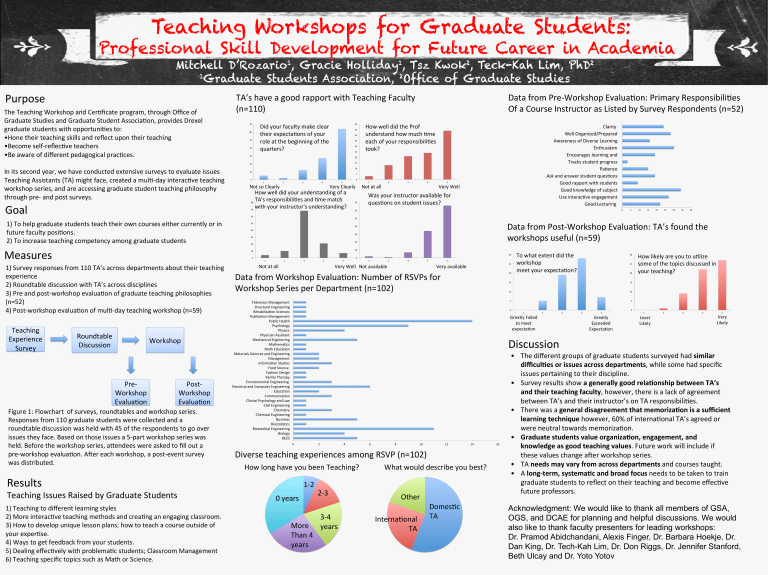Document 11722778

Purpose
The Teaching Workshop and Cer<ficate program, through Office of
Graduate Studies and Graduate Student Associa<on, provides Drexel graduate students with opportuni<es to:
• Hone their teaching skills and reflect upon their teaching
• Become self-‐reflec<ve teachers
• Be aware of different pedagogical prac<ces.
In its second year, we have conducted extensive surveys to evaluate issues
Teaching Assistants (TA) might face, created a mul<-‐day interac<ve teaching workshop series, and are accessing graduate student teaching philosophy through pre-‐ and post surveys.
Goal
1) To help graduate students teach their own courses either currently or in future faculty posi<ons.
2) To increase teaching competency among graduate students
Measures
1) Survey responses from 110 TA’s across departments about their teaching experience
2) Roundtable discussion with TA’s across disciplines
3) Pre and post-‐workshop evalua<on of graduate teaching philosophies
(n=52)
4) Post-‐workshop evalua<on of mul<-‐day teaching workshop (n=59)
Teaching
Experience
Survey
Pre-‐
Workshop
Evalua<on
Post-‐
Workshop
Evalua<on
Figure 1: Flowchart of surveys, roundtables and workshop series.
Responses from 110 graduate students were collected and a roundtable discussion was held with 45 of the respondents to go over issues they face. Based on those issues a 5-‐part workshop series was held. Before the workshop series, a_endees were asked to fill out a pre-‐workshop evalua<on. A`er each workshop, a post-‐event survey was distributed.
Results
Roundtable
Discussion
Workshop
Teaching Issues Raised by Graduate Students
1) Teaching to different learning styles
2) More interac<ve teaching methods and crea<ng an engaging classroom.
3) How to develop unique lesson plans; how to teach a course outside of your exper<se.
4) Ways to get feedback from your students.
5) Dealing effec<vely with problema<c students; Classroom Management
6) Teaching specific topics such as Math or Science.
TA’s have a good rapport with Teaching Faculty
(n=110)
70
60
50
40
Did your faculty make clear their expecta<ons of your role at the beginning of the quarters?
50
45
40
35
30
25
How well did the Prof understand how much <me each of your responsibili<es took?
30
20
15
20
10
10
5
0
1
Not so Clearly
80
70
2 3 4
0
5 1
Very Clearly Not at all
How well did your understanding of a
TA's responsibili<es and <me match with your instructor's understanding?
70
60
2 3 4 5
Very Well
Was your instructor available for ques<ons on student issues?
60
50
50
40
40
30
30
20
20
10
10
0
1
Not at all
2 3 4 5
Very Well
0
1
Not available
2 3 4 5
Very available
Data from Workshop Evalua<on: Number of RSVPs for
Workshop Series per Department (n=102)
Television Management
Structural Engineering
Rehabilita<on Sciences
Publica<on Management
Public Health
Psychology
Physics
Physician Assistant
Mechanical Enginerring
Mathema<cs
Math Educa<on
Materials Sciences and Engineering
Management
Informa<on Studies
Food Science
Fashion Design
Family Therapy
Environmental Engineering
Electrical and Computer Engineering
Educa<on
Communica<on
Clinical Psychology and Law
Civil Engineering
Chemistry
Chemical Engineering
Business
Biosta<s<cs
Biomedical Engineering
Biology
BEES
0 2 4 6 8 10 12 14
Diverse teaching experiences among RSVP (n=102)
How long have you been Teaching?
0 years
0 Years
1-‐2
2-‐3
More
Than 4
3-‐4 years
3-‐4 years
What would describe you best?
Other
Interna<onal
TA
Domes<c
TA
16
Data from Pre-‐Workshop Evalua<on: Primary Responsibili<es
Of a Course Instructor as Listed by Survey Respondents (n=52)
Clarity
Well Organized/Prepared
Awareness of Diverse Learning
Enthusiasm
Encourages learning and
Tracks student progress
Pa<ence
Ask and answer student ques<ons
Good rapport with students
Good knowledge of subject
Use interac<ve engagement
Good Lecturing
0 5 10 15 20 25 30 35 40
Data from Post-‐Workshop Evalua<on: TA’s found the workshops useful (n=59)
15
10
5
30
25
20
To what extent did the workshop meet your expecta<on?
10
5
30
25
20
How likely are you to u<lize some of the topics discussed in your teaching?
15
0
1
Greatly Failed to meet expecta<on
2 3 4 5
Greatly
Exceeded
Expecta<on
0
1
Least
Likely
2 3 4 5
Very
Likely
Discussion
• The different groups of graduate students surveyed had similar difficul,es or issues across departments , while some had specific issues pertaining to their discipline.
• Survey results show a generally good rela,onship between TA’s and their teaching faculty , however, there is a lack of agreement between TA’s and their instructor’s on TA responsibili<es.
• There was a general disagreement that memoriza,on is a sufficient learning technique however, 60% of interna<onal TA’s agreed or were neutral towards memoriza<on.
• Graduate students value organiza,on, engagement, and knowledge as good teaching values . Future work will include if these values change a`er workshop series.
• TA needs may vary from across departments and courses taught.
• A long-‐term, systema,c and broad focus needs to be taken to train graduate students to reflect on their teaching and become effec<ve future professors.


